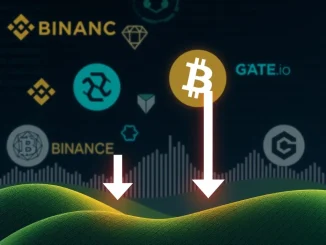
Changpeng Zhao, widely known as CZ and the former CEO of Binance, has sparked significant discussion within the crypto community with a recent suggestion. Taking to X (formerly Twitter), CZ proposed that the current market climate might be opportune for the launch of an on-chain dark pool DEX, specifically one incorporating perpetuals trading. This idea aims to tackle persistent issues like MEV (Maximal Extractable Value) and front-running that plague decentralized exchanges.
Understanding MEV and Front-Running in Crypto
Before diving into CZ’s solution, let’s quickly clarify the problems he seeks to address:
- MEV: This refers to the profit that can be extracted by blockchain participants (like miners or validators) by arbitrarily including, excluding, or reordering transactions within a block.
- Front-Running: A specific type of MEV where a party sees a pending transaction (like a large buy order on a DEX) and places their own transaction ahead of it (buying the asset first) to profit from the subsequent price movement caused by the original transaction.
These issues can lead to significant disadvantages for regular traders, resulting in higher slippage and increased costs, particularly for large orders.
CZ’s Bold Dark Pool DEX Proposal
CZ’s core idea for a dark pool DEX revolves around minimizing the visibility of large orders before they are executed on-chain. He suggested methods such as:
- Hiding order books entirely from public view until execution.
- Delaying the visibility of smart contract deposits associated with large trades.
The rationale is simple: if other market participants cannot see a large order coming, they cannot front-run it or exploit it via MEV strategies. This could, theoretically, create a fairer trading environment for those placing substantial trades.
Why On-Chain Trading Needs Innovation
Traditional finance uses dark pools for institutional investors to trade large blocks of securities without impacting market prices before execution. Applying this concept to on-chain trading presents unique technical challenges and opportunities.
CZ highlighted that placing a large order, like a hypothetical $1 billion buy on a standard transparent DEX, is highly susceptible to immediate exploitation. The transparency inherent in most public blockchains, while beneficial in many ways, becomes a liability for large-volume traders facing sophisticated MEV bots.
Exploring Zero-Knowledge and Privacy Tech
To achieve the necessary privacy and order concealment, CZ pointed towards advanced cryptographic methods. He specifically mentioned utilizing zero-knowledge (ZK) proofs or similar encryption techniques.
ZK technology allows one party to prove to another that a statement is true, without revealing any information beyond the validity of the statement itself. In the context of a dark pool DEX, this could potentially be used to prove that a user has the funds for an order and that the order parameters are valid, all without revealing the details of the order or the user’s identity to the broader network or potential front-runners until the trade is confirmed.
Benefits and Challenges of a Dark Pool DEX
Implementing such a system isn’t without its complexities and debates.
Potential Benefits:
- Reduced Slippage: Large orders execute closer to the intended price.
- Combat MEV/Front-Running: Makes it harder for malicious actors to exploit pending trades.
- Attract Institutional Flow: May appeal to larger traders who require privacy and better execution for significant positions.
- Fairer Execution: Creates a more level playing field for large orders.
Potential Challenges:
- Transparency Concerns: Some argue that hiding orders goes against the core ethos of blockchain transparency.
- Market Discovery: Reduced visibility might impact price discovery mechanisms.
- Complexity: Implementing ZK or similar tech in a performant DEX is technically demanding.
- Liquidity Aggregation: Integrating with existing liquidity sources might be complicated.
While some market participants argue that full transparency is necessary for market makers to effectively absorb large orders, CZ’s perspective acknowledges that different trading styles and volumes may benefit from varied market structures. A dark pool option could coexist with transparent DEXs, offering traders a choice based on their needs.
Conclusion: A Bold Step Towards Fairer On-Chain Trading?
CZ’s suggestion for an on-chain dark pool DEX is a thought-provoking concept aimed directly at some of the most pressing issues in decentralized finance: MEV and front-running. By leveraging technologies like zero-knowledge proofs, such a platform could potentially offer a sanctuary for large-volume traders seeking better execution and reduced costs.
While challenges related to transparency and technical complexity remain, the idea highlights the ongoing innovation required to mature the on-chain trading landscape. Whether this specific proposal gains traction or inspires alternative solutions, the focus on creating fairer, more efficient decentralized markets remains a critical goal for the industry.



